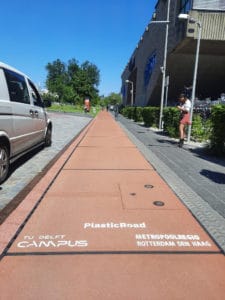27 Jun 2022
An intelligent stretch of bicycle path that maps out how much traffic, at what speed and at what time it travels over it, is no longer utopian but reality and can be found on the TU Delft Campus. The advanced sensors installed and measurements that are made make this bicycle path the most intelligent in the Netherlands. The cycle path provides crucial information about the behaviour of road users, which can then be used to manage the accessibility of cities of the future in a smarter and more efficient way.
Various sensors, including StreetSense, provide insight into how a road is used and what effects this has on the cycle path. Information about the temperature and amount of precipitation is also collected. These sensors – under and in the road surface – complement the advanced above-ground monitoring system on campus, which consists of 3D cameras, WiFi, radar, Bluetooth and mmwave. The project forms an important test case for the operation of various sensors that can be further developed with the experiences from this project.
The intelligent cycle path consists of sustainable and circularly designed elements made from recycled household plastic waste and, because of the hollow space, also functions as a temporary storage area for precipitation. Roads that ‘understand’ how they are used, what kind of traffic goes over them, how much water they can store and can subsequently communicate with other platforms, such as traffic lights, public lighting, dynamic signage but also, for example, maintenance planning and sewerage, that is the future. Plastic Road, which is working on the most intelligent bicycle path together with TU Delft, Mobility Innovation Center Delft, Do IoT Fieldlab, MRDH, Municipality of Delft, Argaleo, AssetInsight, Bainisha, BG-Engineering, Hyrde, Mobility Sensing and Vialis.
The first promising results of the project were presented in mid-June. In particular combining different data provides valuable information. For example, about road safety in relation to weather conditions. And analyzing traveler behaviour down to a detailed level – while preserving privacy of course. About how cyclists and pedestrians move along the bicycle path, about evasive manoeuvres, stress factors, what types of vehicles use the bicycle path, etc. The data collected from the built-in sensors proves to be very valuable for policy makers in limiting traffic and improving the safety of road users. According to project leader Sascha Hoogendoorn, it is already possible to estimate how busy the entire campus will be on the basis of a small section of bicycle path. “In practice, this means that you don’t have to measure everywhere to make these kinds of estimates,” says Hoogendoorn.
More scientific results of the pilot are expected in the spring of 2023.
More about the project and short animation can be found at:
https://micd.tudelftcampus.nl/projects/intelligent-bicycle-path/

⏵ back to the News page